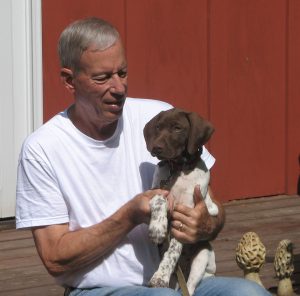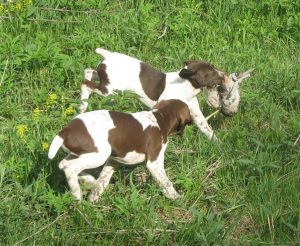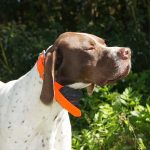The Sound Pointing Dog
POINTING DOG POINTERS March 2017
By Bob and Jody Iler
With spring just days away on this month’s calendar, the thoughts of many “pointing dog people” turn to . . . nope, not love . . . but puppies! Well actually, we all love puppies so they do kind of go together, right?
And etched in the many treasured moments of our personal memory bank is the day we brought that first pointing dog pup home. The day we drove many miles to pick up a pup that had been “pre-chosen” for us, reserved before she was even born. Or maybe it was the day we went to a kennel and one particular puppy emerged from his lookalike littermates to choose us.
If you’re new to pointing dogs, you have that day to look forward to! But how do you ensure that you will make the best decision, the best effort, to find a sound pointing dog? Because as we all know, all puppies are cute but not all of them are necessarily “sound.”
We’re in the business of training dogs, not breeding them. We’ve trained many different pointing dog breeds and seen some heartaches over the years.
There was a feisty little French Brittany that started out with a bang in her field training, and developed a genetic problem with her hindquarters that ended her bird dog career before it began. Even worse, her breeder took no responsibility, and the little dog was a well-loved family member.
A German Wirehair that we trained proved to be a superb hunting dog. His owner enjoyed a season or two with this dog before he began to show signs of aggressiveness. Eventually, the dog wouldn’t even let his owner take him out of his crate, and since this dog, too, was a member of a family with children, he had to be put down.
Certain breeds are predisposed to particular genetic problems but these physical issues as well as variations in temperament can be found in all pointing dog breeds.
So what do you do?
“Don’t pick the puppy – pick the litter” is a good rule of thumb. Research good breeders who have invested years, commitment, and their good reputations in programs that focus on making the breed better. This means producing dogs with sound physical genetics, with pedigrees that certify dogs free of hip dysplasia and other physical issues. There’s another saying, “function follows form,” which simply means that a sound conformation (a well-put-together dog) ensures that he will be able to do what he was bred for – to run and hunt effortlessly, with class, style and endurance.
Pedigrees also note field, show or obedience titles earned by your pup’s ancestors. This indicates innate hunting ability, excellence in conformation, trainability, and intelligence. Pedigrees don’t always indicate temperament, however, and your best bet is to meet the parents of your pup’s litter. If mom and dad are outgoing and friendly, pups are likely to be the same. If one or both of the parents are shy, wary or even aggressive, be cautious in choosing a pup from that litter.
All that being said, dogs, like people, do come with quirks. Our own personal pointing dogs have them. Our English pointer is stubborn to a fault. He has taken over the best recliner in our living room. He pesters for attention and loves ice cream. He is aging now and experiencing hip issues, but he was one of the classiest bird dogs we’ve ever owned. Our little English setter trembles when the oven is on, and is terrified of vehicles that speed down the road. But she too, is a top notch bird dog with tremendous style and drive. And smart and clownish to boot.
Quirks are okay and make our canine family members loveable and special. But viciousness, dominance, extreme timidity, and painful shyness are not quirks. They are issues that can be difficult to deal with and in the case of the aggressive, vicious dog, there is only one option.
So finding a sound pointing dog begins with finding a reputable breeder of quality dogs with good pedigrees, sound conformation and health/genetic certifications, and proven field ability. Make sure to meet the pup’s parents and also establish what guarantee comes with your pup, should something go wrong health-wise. Good breeders will stand behind their program and want you to be satisfied. They may also recommend a pup from the litter that might be the best choice for you, depending on your goals, age, experience, etc.
As pups grow, things can change and different issues can emerge. If you’ve started with the best sound puppy you can find, the responsibility now lies with you to make sure you know how to properly develop that pointing dog pup and not create any problems by the way you interact with your pup.
In the baby stages, keep puppy safe, well-fed, and comfortable – with plenty of the exercise and stimulation that puppies need. Your new family member can’t be left alone all day in a crate while you’re at work, especially in the beginning! Arrange to have some time off from the job to get your pup into a routine that he can depend on and feel reassured by. Housebreaking, simple puppy commands, and lots of companionship, love and fun should be your main focus.
As she develops, your “baby bird dog” won’t automatically know that she’s supposed to love birds, hunt, point and handle well, although many pups will show lots of interest and point in those early months if gently and correctly acquainted with birds. She won’t automatically love the sound of a gun and zip off to the truck to go hunting!
These are all things that run deep within her blood, of course, but bringing them out in the right way is your job. That sound pup that started out as a clean slate can develop man-made problems, even with owners who have the best of intentions.
Educate yourself by reading and learning about the best, gentle ways to bring out your pup’s abilities. Checking out our past nine years of monthly columns will offer you an abundance of help in addressing just about any issue you can think of! And The Pointing Dog Journal is packed with the best training articles and tips around, plus advice on where to find good trainers should you need one.
Don’t be in a hurry – developing great bird dogs takes time – start with a sound pup and keep it that way by having fun and taking your time. One day, you’ll look back at your first pointing dog and remember the day you brought her home, and all the years of pleasure she gave you.
Pointing Dog Pointers features monthly training tips by Bob and Jody Iler, who own Green Valley Kennels in Dubuque, Iowa. Bob and Jody have trained pointing dogs for over 35 years and have written many articles for The Pointing Dog Journal.







